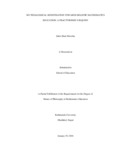
Please use this identifier to cite or link to this item:
https://hdl.handle.net/20.500.14301/356| Title: | My Pedagogical Sensitisation Towards Holistic Mathematics Education: A Practitioner’s Inquiry |
| Authors: | Shrestha, Indra Mani |
| Citation: | Shrestha,I.M.(2018).My pedagogical sensitisation towards holistic mathematics education: a practitioner’s inquiry |
| Issue Date: | Jan-2018 |
| Publisher: | Kathmandu University School of Education |
| School: | SOED |
| Department: | DOSE |
| Level: | M.Phil. |
| Program: | MPhil in STEAM Educaiton |
| Abstract: | In this research study, I critically explored, re/examined, re/invented and reflected on my pedagogical practices using auto/ethnography as research methodology and writing narratives as a method of inquiry under multi-paradigmatic research design space. I employed three key research paradigms – interpretivism, criticalism, and postmodernism. Since the purpose of my research study was to improve my pedagogical practices and explore non/linear approaches of teaching and learning of mathematics so as to envision holistic mathematics education, I employed three key grand theories as referents – Living Educational Theory, Transformative Learning Theory and Knowledge Constitutive Interests so as to explore my lived and living experiences and contradictions throughout the research study. At the time I started my journey of pedagogical practices professionally, I would think that teaching mathematics was all about transmitting universal mathematical knowledge and skills to students as passive recipients, thereby often giving emphasis on algorithmic problem solving methods. I would believe to follow the assumptions of behaviourism that by controlling rewards and punishments, I could shape my students’ behaviour. However, my ways of knowing (epistemology), ways II of being/becoming (ontology), ways of valuing (axiology) and ways of sensing (aesthetics) gradually got transformed to critically view ‘self’ and ‘others’ and act accordingly in due course of pedagogical practices from my master’s and MPhil study, and hence I became a teacher with transformative sensibility. Being a teacher with transformative sensibility, I often realised that I was unable to do justice to the principles of transformative education as I came to know that “transformative learning involves using cognitive, emotional, social and (for some) spiritual ‘tools’ to reconceptualise and reshape the relationship between the outer (material) and inner (non-material) worlds” (Taylor, 2015, pp. 1080-1081). I also realised that I was still using the reductionist ideology, which gives more emphasis to linear methods of teaching and learning, and prevents mathematics education from being an emergent domain of inquiry, thereby reducing it to an unchangeable discipline via the image of curriculum as subject matter (Luitel, 2009). Moreover, my materialistic approach of teaching at that time disconnected students’ mathematics learning from that of humanistic perspective of education, thereby giving rise to linearity in teaching and learning of mathematics in the classroom. In this regard, this research study was oriented to an inquiry into the problems of linear teaching and learning of mathematics due to reductionism in Nepali mathematics education so as to seek possible ways of improving my pedagogical practices through non/linear approaches of teaching and learning, and envision holistic Nepali mathematics education that is inclusive, authentic and empowering. |
| URI: | https://hdl.handle.net/20.500.14301/356 |
| Appears in Collections: | Dissertation |
Files in This Item:
| File | Description | Size | Format | |
|---|---|---|---|---|
| MPhil Thesis [Indra Mani Shrestha].pdf | 2.53 MB | Adobe PDF |  View/Open |
Items in DSpace are protected by copyright, with all rights reserved, unless otherwise indicated.